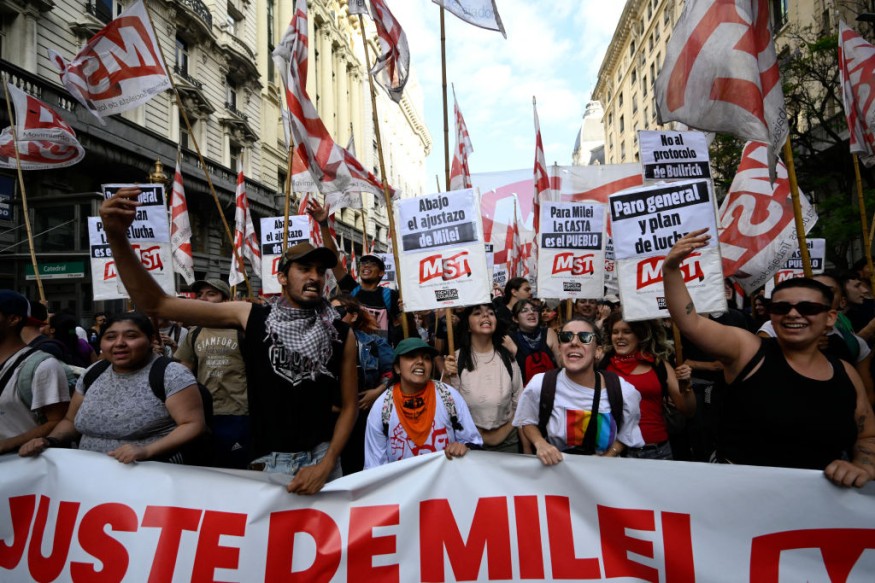Argentina President Javier Milei Faces First Public Protest

Thousands of people flooded the streets of Buenos Aires on Wednesday in a massive demonstration against the economic shock measures implemented by new Argentina president Javier Milei, according to Reuters.
This marks the first significant challenge for Milei, who assumed office with a commitment to cut public spending and initiate broad economic reforms.
Argentina President Javier Milei, in office for only a few weeks, has already stirred controversy by announcing a 54% devaluation of the peso currency, subsidy cuts, and the closure of certain government ministries.
These measures, intended to address Argentina's severe economic crisis, have triggered unrest among social groups opposing what they term "shock therapy."
Led by groups representing the unemployed, the protesters marched towards the main Plaza de Mayo square, a historic gathering spot in front of the presidential palace.
They called for increased financial support for the impoverished amid a robust police presence.
Authorities redirected the protesters to pavements to allow traffic to flow, emphasizing a commitment to a peaceful demonstration.
READ NEXT : Argentina Economic Crisis
New Security Protocol Raises Concerns
Argentina President Javier Milei's security minister, Patricia Bullrich, introduced a new "protocol" aimed at maintaining public order, AP reports.
This protocol empowers federal forces to disperse people blocking streets without a judicial order and allows the police to identify and bill individuals protesting and obstructing public thoroughfares using video or digital means.
The protocol, designed to prevent blockades, particularly in Buenos Aires, where protests often disrupt streets for hours, has faced criticism.
Some groups argue that it oversteps bounds, potentially criminalizing the right to protest.
In response, Argentine labor, social, and human rights groups submitted a petition to the United Nations and the Inter-American Commission on Human Rights, expressing concerns about the protocol's compatibility with constitutional rights.
The government went a step further by announcing that individuals blocking streets could be removed from public assistance benefit lists if they were recipients.
The Human Capital Ministry emphasized the right to protest but underscored the importance of allowing free movement throughout the country.
Argentina Economic Crisis
Argentina President Javier Milei defended his economic measures, describing them as only the first step in reversing Argentina's prolonged economic slump, BBC noted.
The government recently devalued its currency by more than 50% against the US dollar, reducing the exchange rate to 800 pesos from roughly 391 pesos.
The move is an attempt to address the artificially strong currency maintained since 2019, which led to increased demand for the US dollar on the informal market.
Economy Minister Luis Caputo announced significant cuts to public spending, including reductions in fuel and transport subsidies and a freeze on spending for certain government contracts and advertising, all in response to soaring inflation, high government debt, and low cash reserves.
Approximately 40% of the population lives below the poverty line.
The International Monetary Fund (IMF), to which Argentina owes $44 billion, described the measures as "bold" and anticipates that they will create an environment conducive to private sector growth.
The situation in Argentina remains fluid, with ongoing protests reflecting the challenges and tensions surrounding Argentina President Javier Milei's economic reforms.
Read also: Haiti: Former Senator Gets Life Sentence
This article is owned by Latin Post.
Written by: Bert Hoover
WATCH: Argentina: first major protests against Argentina's new president Javier Milei DW News - From DW News
Subscribe to Latin Post!
Sign up for our free newsletter for the Latest coverage!
















